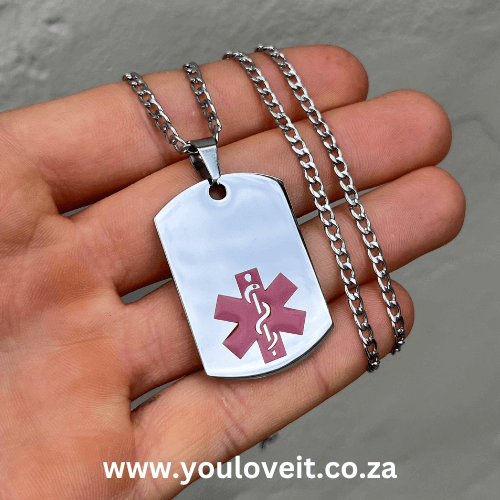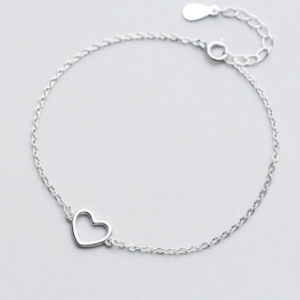Description
Wearing an In Case of Emergency (I.C.E) medical necklace is a practical and valuable precaution for teenagers who may have specific health conditions, allergies, or medical needs. These necklaces serve as a visible and easily accessible means of communicating crucial health information in case of an emergency. For teenagers who may be more independent or engage in activities without direct adult supervision, an I.C.E medical necklace becomes an extra layer of safety and support.
Teenagers with chronic medical conditions such as diabetes, epilepsy, asthma, or severe allergies can benefit significantly from wearing an I.C.E medical necklace. In the event of an emergency, when the individual may be unable to communicate their medical history, the necklace provides immediate access to critical information for first responders and healthcare professionals.
Additionally, teenagers who participate in sports, outdoor activities, or travel may find an I.C.E medical necklace particularly useful. Accidents or unexpected health incidents can happen, and having pertinent health details readily available can aid in faster and more effective medical interventions.
It’s essential to engrave the necklace with concise yet comprehensive information, including:
- Emergency Contacts:
- Names and phone numbers of parents, guardians, or other emergency contacts.
- Medical Conditions:
- Any chronic medical conditions or underlying health issues.
- Allergies:
- Information about severe allergies to medications, foods, or environmental factors.
- Medications:
- List of medications the teenager is currently taking, including dosage information.
- Blood Type:
- Blood type information can be crucial in certain medical situations.
- Any Special Instructions:
- Pertinent details about the teenager’s health that may require specific actions or precautions.
Encouraging teenagers to wear an I.C.E medical necklace empowers them to take ownership of their health and safety. It also provides peace of mind for parents and caregivers, knowing that essential health information is easily accessible in case of an emergency. Additionally, educating teenagers about the importance of the necklace and regularly updating the information engraved on it ensures that it remains a relevant and effective tool for their well-being.
Some common examples of chronic medical conditions include:
- Diabetes:
- A group of metabolic disorders characterized by high blood sugar levels, either due to insufficient insulin production or the body’s inability to use insulin effectively.
- Hypertension (High Blood Pressure):
- A condition in which the force of the blood against the walls of the arteries is consistently too high, putting strain on the cardiovascular system.
- Asthma:
- A chronic respiratory condition that causes inflammation and narrowing of the airways, leading to symptoms such as wheezing, shortness of breath, and coughing.
- Chronic Obstructive Pulmonary Disease (COPD):
- A group of progressive lung diseases, including chronic bronchitis and emphysema, that impede airflow and make breathing difficult.
- Heart Disease:
- Various conditions affecting the heart, including coronary artery disease, heart failure, and arrhythmias.
- Arthritis:
- Inflammation of the joints, leading to pain, stiffness, and swelling. Osteoarthritis and rheumatoid arthritis are common forms.
- Chronic Kidney Disease:
- Progressive damage to the kidneys over time, impairing their ability to filter waste and excess fluids from the blood.
- Osteoporosis:
- A condition characterized by weakened bones, making them more susceptible to fractures.
- Epilepsy:
- A neurological disorder characterized by recurrent seizures, which are disruptions in the normal electrical activity of the brain.
- Inflammatory Bowel Disease (IBD):
- Conditions such as Crohn’s disease and ulcerative colitis, involving chronic inflammation of the gastrointestinal tract.
- Autoimmune Diseases:
- Conditions where the immune system mistakenly attacks the body’s own tissues, such as rheumatoid arthritis, lupus, or multiple sclerosis.
- Mental Health Disorders:
- Conditions like depression, anxiety disorders, bipolar disorder, and schizophrenia, which can require ongoing management and treatment.
Living with a chronic medical condition often involves a combination of medical care, medication, lifestyle modifications, and sometimes, ongoing monitoring. Management strategies may vary depending on the specific condition and its severity. Cape Town, a vibrant coastal city in South Africa, boasts a diverse array of medical facilities catering to the healthcare needs of its residents and visitors. The city is home to a mix of public and private hospitals, clinics, and specialized medical centers, ensuring comprehensive healthcare services. Some notable medical institutions include Groote Schuur Hospital, affiliated with the University of Cape Town, renowned for its medical research and academic excellence.








